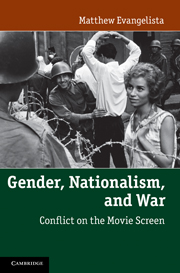Book contents
- Frontmatter
- Contents
- List of figures
- Preface
- 1 Virginia Woolf's purse
- 2 Algeria: a world constructed out of ruins
- 3 Yugoslavia: archetype or anomaly?
- 4 Chechnya: virgins, mothers, and terrorists
- 5 Québec: oui, no, or femme
- 6 “To live to see better times”: gender, nationalism, sovereignty, equality
- Index
- References
4 - Chechnya: virgins, mothers, and terrorists
Published online by Cambridge University Press: 05 June 2012
- Frontmatter
- Contents
- List of figures
- Preface
- 1 Virginia Woolf's purse
- 2 Algeria: a world constructed out of ruins
- 3 Yugoslavia: archetype or anomaly?
- 4 Chechnya: virgins, mothers, and terrorists
- 5 Québec: oui, no, or femme
- 6 “To live to see better times”: gender, nationalism, sovereignty, equality
- Index
- References
Summary
The war has changed the relationship between man and woman, mostly because we, the weaker sex, are more worried about our stronger partners than they are about us.
Kalimat, a café owner in Grozny, 2000During a war women can often do more with their voices and their desperation than men with trench mortars.
Tamara, a Chechen refugee in Stráž pod Ralskem, Czech Republic, 2000Conflict between the central government of Russia and the secessionist republic of Chechnya erupted into open warfare within a few years of the violent disintegration of the Yugoslav federation. Indeed the causes of the breakup of the Soviet Union – nominally a federation of fifteen union republics – resemble those that contributed to Yugoslavia's demise. A key difference is that little violence accompanied the initial Soviet disintegration, whereas the peoples of the Yugoslav successor states endured years of brutal warfare, barbaric “ethnic cleansing,” and civil strife. Only with Moscow's armed attempt to put down the Chechen bid for sovereignty in 1994 did Russia witness a comparable level of violence.
With the formal dissolution of the Soviet Union at the end of 1991, Russia emerged as its largest and most populous successor state. Stretching across eleven time-zones, from Kaliningrad (the former Königsberg) in the west to Vladivostok in the east, the Russian Federation, as it is formally known, contained some hundred different ethnic groups or “nationalities,” as they were called in Soviet parlance, speaking as many languages. Administratively Russia was divided into eighty-nine “subjects” (sub”ekty).
- Type
- Chapter
- Information
- Gender, Nationalism, and WarConflict on the Movie Screen, pp. 139 - 202Publisher: Cambridge University PressPrint publication year: 2011



